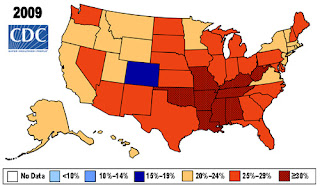 Just read a great article on human evolution and how advantageous traits are likely selected for over time. It got me thinking again about the genetic theory of obesity. Now you all know how I feel about this subject–I pretty much find it a convenient excuse to absolve obese people from their personal responsibility. Put another way: Gene or no gene, you’ve still got to eat well, exercise, and practice discipline. Hey, we all have to that.
Just read a great article on human evolution and how advantageous traits are likely selected for over time. It got me thinking again about the genetic theory of obesity. Now you all know how I feel about this subject–I pretty much find it a convenient excuse to absolve obese people from their personal responsibility. Put another way: Gene or no gene, you’ve still got to eat well, exercise, and practice discipline. Hey, we all have to that.
But reading this article in the September issue of Scientific American (I know I’m behind…cut me a break…I’ve got kids) titled, How We Are Evolving, got me thinking that obesity very well may have a genetic link. According to recent research, most traits that provide genetic advantage or disadvantage likely take tens of thousands of years to disseminate throughout a population, not the thousands of years a high frequency mutation was once thought to dominate natural selection. I won’t get into the science here; read the article to get the details–it is excellent. Suffice it to say that the data shows evolution to be a long, drawn-out process, as natural selection takes time.
Okay, so what about obesity? Well, let’s just say there is a gene, or genes, that increase one’s susceptibility to becoming obese; we might just find that that genetic makeup actually does lead to enough of a disadvantage that it eventually gets selected out of the human genome.
Think about it like this: obesity offers a disadvantage by making a person more susceptible to illness and disease–like many cancers, heart disease, stroke, and the list goes on and on. Up until now it hasn’t conferred enough disadvantage to be selected out of the population–that is, obese people can still pass on their genes.
 However, as more of the population gets obese–34% of all adults in the U.S. and 300 million worldwide–less and less may find the opportunity to reproduce. What do you mean, Campos? Just a thought, but when approximately 20% of our children here in the U.S. are obese…that’s a BMI over 30!…there may come a time when these people are just not considered reproduction material.
However, as more of the population gets obese–34% of all adults in the U.S. and 300 million worldwide–less and less may find the opportunity to reproduce. What do you mean, Campos? Just a thought, but when approximately 20% of our children here in the U.S. are obese…that’s a BMI over 30!…there may come a time when these people are just not considered reproduction material.
Biologically speaking, organisms seek out the most fit individuals with which to mate so that the possibility of passing on one’s genes increases. That’s the idea anyway. As the numbers of obese individuals increases, as well as society’s disdain (just read the news!) for obesity, you might just see more of these people ostracized sexually. Not large numbers right away, mind you–this is where the article got me thinking–but over time. Could be tens of thousands of years. Remember, natural selection works slowly. I mean, things would really have to change societally for this to be considered no big deal.
 And yes, obese mating with obese is always a possibility, but that will simply raise the risk, in my opinion, for the genes to become selected out. This, of course, all predicates on whether a genetic cause (susceptibility?) of obesity actually exists.
And yes, obese mating with obese is always a possibility, but that will simply raise the risk, in my opinion, for the genes to become selected out. This, of course, all predicates on whether a genetic cause (susceptibility?) of obesity actually exists.
My advice to everyone is, once again, gene or no gene, you can prevent obesity by doing the right things. If my thoughts are correct–and sorry, you and I will never get to know–then you’ll be assuring your genes get passed on to future generations by removing and preventing obesity in your life. Just a thought, anyway.












